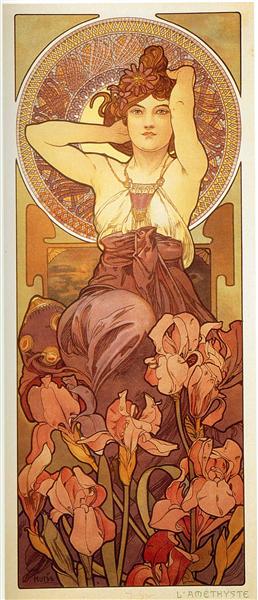Description
The "amethyst" painting of 1900, created by the famous Czech artist Alfons Much, is a clear example of the Art Nouveau style, which characterizes its production and has left an indelible mark on the history of art. Much is known for his works that combine a lush aesthetic with the inspiration in nature and the female figure, elements that are present in this piece masterfully.
In "amethyst", much uses a colored palette that evokes the very essence of the precious stone to which the title refers. Purple and violet tones dominate, creating a dream atmosphere that suspends time and transports the viewer to a world of delicacy and sophistication. The choice of these colors is not accidental; The amethyst, in tradition, symbolizes tranquility, spirituality and, in some cultures, even has connotations of protection and mental clarity. This meaning resonates in the general composition, which seems to invite a deep reflection in the midst of its visual beauty.
The central figure of the work is a woman who emanates elegance and serenity. His representation is typically idealized, a distinctive feature in the work of Much, who approaches the female figure with an almost reverential admiration. The woman is surrounded by floral and arabesque motifs that flow and intertwine, a common pattern in the Art Nouveau, where natural ornamentation and decorative design give prominence to the figure that lives. The relaxed possession of the woman and her contemplative expression suggest a connection between the human being and the natural environment, a frequent topic in the work of much, that explores the interrelation between the human figure and its environment.
The background, which also displays in violet and gold tones, perfectly complements the central figure, projecting an air of harmony and cohesion. The master's degree in the elaboration of details is evidenced in the delicacy of the lines that contour both the women and the floral elements, creating an almost three -dimensional effect that catches the viewer's gaze. This attention to detail that includes hair texture to the subtle reflexes of light in the skin is a testimony of its ability to merge realism and stylization, a duality that has defined its style.
In addition to its composition and its color, "amethyst" is inserted in a broader cultural context that covers the Art Nouveau movement, which sought to break the classic forms and explore new aesthetic paths. Much, as one of the main exponents of this movement, used his art to communicate ideas of spirituality, beauty and the celebration of modern life. His work served, in many ways, as a bridge between art and advertising, an aspect that can also be observed in the almost advertising quality of this work, which evokes a sense of desire and aspiration.
In summary, Alfons's "amethyst" is much more than a simple art work; It is the representation of an amalgamated aesthetic ideal with a deep symbolism. Through his palette, his ornamentation, and the context of his central figure, he manages to encapsulate the essence of Art Nouveau and his own worldview, inviting the viewer to appreciate both the outer beauty and the introspection that such beauty can inspire. This work is, without a doubt, a testimony of the Master's degree and its ability to weave visual narrative through emotion and aesthetics.
KUADROS ©, a famous paint on your wall.
Hand-made oil painting reproductions, with the quality of professional artists and the distinctive seal of KUADROS ©.
Art reproduction service with satisfaction guarantee. If you are not completely satisfied with the replica of your painting, we refund your money 100%.

